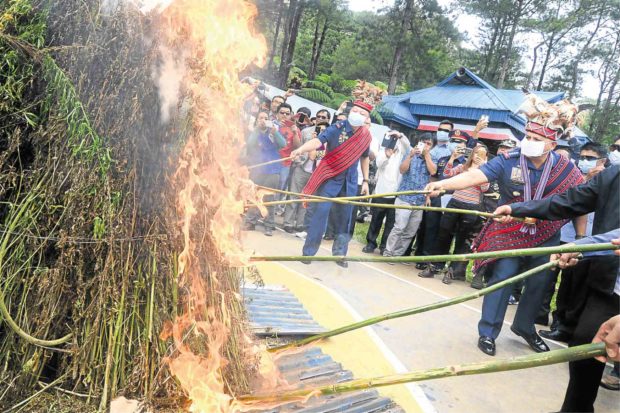
WEED AND FIRE Philippine National Police Director General Ronald dela Rosa (right) leads the burning of marijuana leaves confiscated in police operations in Kalinga province. —KARLSTON LAPNITEN
LA TRINIDAD, Benguet — Legalized marijuana cultivation for medicinal purposes can boost the economy of Benguet province, which supplies most of the salad vegetable needs of Metro Manila, Gov. Cresencio Pacalso said here on Monday.
As of now, the cold climate and the mountain terrain have made some parts of the province suitable for planting marijuana.
The police conduct routine eradication operations in the tri-boundaries of Benguet, La Union and Ilocos Sur provinces as well as interior communities of Mountain Province and Kalinga.
Of the three Benguet towns where marijuana cultivation has been observed, only Barangay Badeo and Takadang in Kibungan have not been declared as “drug-free,” according to the police.
The two villages are among the most remote and underdeveloped communities in the province with Badeo classified as being geographically isolated and disadvantaged.
In 2016, Kibungan received P80 million as its internal revenue allotment (IRA) but Badeo’s IRA was only P1.4 million. The IRA represents local government shares from taxes collected each year by the national government.
Kibungan Mayor Cesar Molitas, however, said the two villages had not been removed from the list of “drug-free” areas not because of the marijuana plantations but because of the presence of drug peddlers there.
Former Mayor Benito Siadto said many livelihood projects were introduced to the marijuana-growing villages but the absence of roads derailed the programs. Takadang and Badeo can be reached after six to eight hours of hiking.
Molitas said 100 marijuana cultivators surrendered to the police in June.
The police said the Cordillera had been a top producer of marijuana in Luzon. In 2016, marijuana plants worth P5.8 billion were seized in drug eradication campaigns. The police also seized processed dry marijuana bricks and hashish, a liquid form of the weed.
Kapangan town used to be credited for growing marijuana and was the subject of alternative livelihood projects, including mulberry farming to develop a silkworm industry.
This year, the government is propagating the Davao cacao to displace marijuana grown in Kibungan. Pacalso said the provincial government had set aside P1 million for the project.
According to provincial agriculturist Lolita Bentres, 2,350 seedlings of cacao were distributed to 50 farmers while 3,350 seedlings would be distributed in September to another batch of farmers. —KARLSTON LAPNITEN